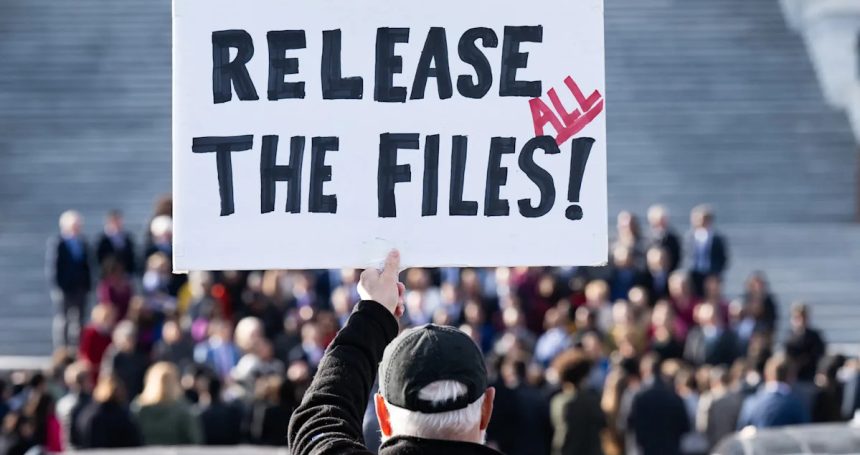President Trump on Wednesday signed into law a bill to compel the Justice Department to release all of its files related to the investigation of convicted sex offender Jeffrey Epstein.
The bipartisan measure known as the Epstein Files Transparency Act was overwhelmingly backed by both chambers of Congress, which overcame months of opposition from Trump and some of his Republican allies to pass the legislation.
It requires the DOJ to “publish (in a searchable and downloadable format) all unclassified records, documents, communications, and investigative materials” related to Epstein within 30 days. But it’s unclear when or how much of that material will be released.
Trump announced the signing in a post on Truth Social in which he accused Democrats of using Epstein as a distraction.
“Democrats have used the ‘Epstein’ issue, which affects them far more than the Republican Party, in order to try and distract from our AMAZING Victories,” Trump wrote.
As many observers have noted, Trump had the power to release the files himself without congressional approval — but chose not to use it.
The final vote tally. (House.gov)
The bill was passed by U.S. House of Representatives on Tuesday in a 427-1 vote. Rep. Clay Higgins, a Republican from Louisiana, was the only member to vote against it.
Higgins explained his solitary “no” vote in a post on X.
“I have been a principled ‘NO’ on this bill from the beginning,” Higgins wrote. “What was wrong with the bill three months ago is still wrong today. It abandons 250 years of criminal justice procedure in America. As written, this bill reveals and injures thousands of innocent people — witnesses, people who provided alibis, family members, etc. If enacted in its current form, this type of broad reveal of criminal investigative files, released to a rabid media, will absolutely result in innocent people being hurt. Not by my vote.”
A few hours later, the U.S. Senate agreed to pass the bill by “unanimous consent,” a procedure that allows legislation to proceed to the president’s desk without a formal vote as long as no senator objects on the floor. Democratic Minority Leader Chuck Schumer of New York introduced a unanimous consent motion before the bill arrived from the House.
“This will go down as one of the most damaging moments of Donald Trump’s presidency,” Schumer said. “In trying so hard to hide the truth, Donald Trump has provoked the fiercest rebellion he’s ever faced among his own supporters, both in Congress and around the country.”
Trump, who had long opposed the release of the files, reversed course on Sunday, urging House Republicans to vote for their disclosure “because we have nothing to hide.”
Johnson ‘deeply disappointed’
House Speaker Mike Johnson walks back to his office after the vote to release the Epstein files on Nov. 18. (Sarah L. Voisin/The Washington Post via Getty Images)
House Speaker Mike Johnson, who had called on the Senate to amend the bill before sending it to the president’s desk, said he was “deeply disappointed” that the upper chamber of Congress passed it without making any changes.
Johnson — who had tried to block the bill from coming to the House floor but ultimately voted for its passage — said amendments were necessary because he claimed the legislation provides no protection for victims.
“I am deeply disappointed in this outcome. I was just told that Chuck Schumer rushed it to the floor and put it out there preemptively,” Johnson told reporters late Tuesday night. “It needed amendments. I just spoke to the president about that. We’ll see what happens.”
Johnson added that both he and Trump had “concerns” about the bill, but stopped short of predicting the president would veto it.
Earlier in the day, Senate Majority Leader John Thune, a Republican from South Dakota, said he expected it to move quickly through the upper chamber of Congress, despite Johnson’s call for changes.
“I think there are some things he’d like to change, but you got a 427-1 vote, it’s probably not likely to happen,” Thune said.
What’s next?
President Trump in the Oval Office on Nov. 17. (Evan Vucci/AP)
While the measure calls for the Justice Department to release all the files within 30 days, it’s unclear when the DOJ will do so — or how much of the material it will ultimately release.
According to the text of the bill itself, the “DOJ is permitted to withhold certain information such as the personal information of victims and materials that would jeopardize an active federal investigation.”
Last week, Trump ordered Attorney General Pam Bondi to investigate several Democrats who were mentioned in Epstein’s emails. Bondi immediately complied, naming a special prosecutor to lead the inquiry four months after formally declaring that nothing in the Epstein files warranted further scrutiny.
Speaking at DOJ headquarters on Wednesday, Bondi said she would “follow the law with maximum transparency while protecting victims.” She did not say when or how much material would be released.
Asked earlier Wednesday about the Trump administration’s handling of the Epstein files, Sen. Thom Tillis, a Republican from North Carolina, responded with a blunt message.
“Just release the damn files, period,” Tillis told CNN. “I don’t care about how the sausage is made, I just want it out in the open for everybody to consume.”
How we got here
Epstein has long been the focus of unfounded conspiracy theories that claim the financier — who was found dead in his jail cell in Manhattan in August 2019 after his indictment on federal sex trafficking charges — was actually murdered to conceal the names of powerful people on a secret “client list.” The theories were fueled by Trump and some of his most prominent supporters.
During the 2024 campaign, Trump said he would consider releasing additional government files on Epstein. Shortly after taking office in January, Trump directed the Justice Department to conduct an exhaustive review of the evidence collected on Epstein.
In July, the DOJ and FBI released a two-page joint memo concluding Epstein had “committed suicide in his cell” and compiled no “client list” — adding that “no further disclosure would be appropriate or warranted.”
The move enraged some Trump loyalists, who accused the president and his administration of breaking their promise to release all of the Epstein files. It also put the spotlight back on Trump’s own relationship with Epstein.
Trump then lashed out at supporters for their interest in what he repeatedly referred to as the “Epstein Hoax.”
Reps. Ro Khanna, Thomas Massie and Marjorie Taylor Greene before voting to release the Epstein case files on Nov. 18. (Daniel Heuer/AFP via Getty Images)
The same month, Democratic Rep. Ro Khanna of California introduced the bill, cosponsored by Republican Rep. Thomas Massie of Kentucky, to compel the DOJ to release all of its investigative material on Epstein.
In September, Massie introduced a discharge petition, which allows House members to bypass House leadership and force a vote on any matter if they can get a majority of members — 218 — to support it.
Massie and three other House Republicans — Rep. Marjorie Taylor Greene of Georgia, Rep. Nancy Mace of South Carolina and Rep. Lauren Boebert of Colorado — joined all Democrats in signing it.
Newly elected Democratic Rep. Adelita Grijalva of Arizona, who Johnson had refused to seat during the government shutdown, was the final signatory, forcing Tuesday’s full floor vote on Epstein.
“These women have fought the most horrific fight that no woman should have to fight. And they did it by banding together and never giving up,” Greene said at a news conference alongside some of Epstein’s survivors outside the Capitol Tuesday morning. “That’s what we did by fighting so hard against the most powerful people in the world, even the president of the United States, in order to make this vote happen today.”









